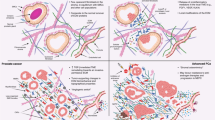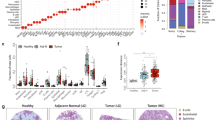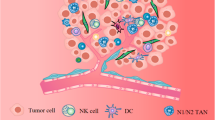Abstract
Background:
Tumours are made up of a mixed population of different types of cells that include normal structures as well as ones associated with the malignancy, and there are multiple interactions between the malignant cells and the local microenvironment. These intercellular interactions, modulated by the microenvironment, effect tumour progression and represent a largely under appreciated therapeutic target. We use observations of primary tumor biology from prostate cancer to extrapolate a mathematical model: specifically; it has been observed that in prostate cancer three disparate cellular outcomes predominate: (i) the tumour remains well differentiated and clinically indolent - in this case the local stromal cells may act to restrain the growth of the cancer; (ii) early in its genesis the tumour acquires a highly malignant phenotype, growing rapidly and displacing the original stromal population (often referred to as small cell prostate cancer) - these less common aggressive tumours are relatively independent of the local microenvironment; and, (iii) the tumour co-opts the local stroma - taking on a classic stromagenic phenotype where interactions with the local microenvironment are critical to the cancer growth. METHODS: We present an evolutionary game theoretical construct that models the influence of tumour-stroma interactions in driving these outcomes. We consider three characteristic and distinct cellular populations: stromal cells, tumour cells that are self-reliant in terms of microenvironmental factors and tumour cells that depend on the environment for resources but can also co-opt stroma.
RESULTS:
Using evolutionary game theory we explore a number of different scenarios that elucidate the impact of tumour-stromal interactions on the dynamics of prostate cancer growth and progression and how different treatments in the metastatic setting can affect different types of tumors.
CONCLUSIONS:
The tumour microenvironment plays a crucial role selecting the traits of the tumour cells that will determine prostate cancer progression. Equally important, treatments like hormone therapy affect the selection of these cancer phenotypes making it very important to understand how they impact prostate cancer’s somatic evolution.
Similar content being viewed by others
Article PDF
Author information
Authors and Affiliations
Corresponding author
Rights and permissions
About this article
Cite this article
Basanta, D., Scott, J., Fishman, M. et al. Investigating prostate cancer tumour-stroma interactions - clinical and biological insights from an evolutionary game. Nat Prec (2011). https://doi.org/10.1038/npre.2011.6385.1
Received:
Accepted:
Published:
DOI: https://doi.org/10.1038/npre.2011.6385.1



